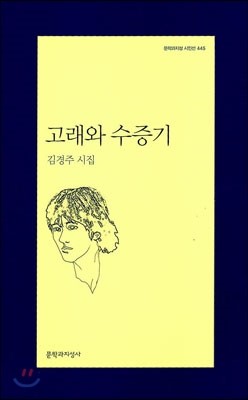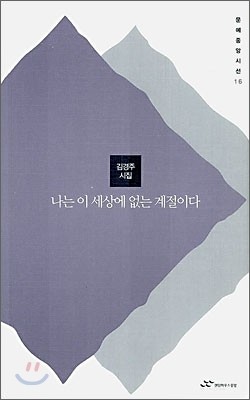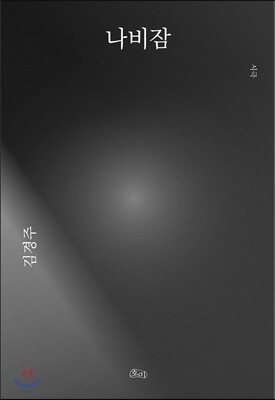Kim Kyung Ju (born July 14, 1976) is a South Korean poet and performance artist.
Life
Kim Kyung Ju was born in Gwangju. He studied philosophy at Sogang University and musical theatre writing at Korea National University of Arts. Kim made his literary debut in 2003 winning the Seoul Shinmun New Writer's Contest with five poems including "Kkot pineun gongjungjeonhwa" (꽃 피는 공중전화 Phone Box in Flower). His first collection of poetry, Naneun i sesange eomneun gyejeorida (나는 이 세상에 없는 계절이다 I Am A Season That Does Not Exist In the World), was published in 2006 and made waves in the literary world, selling over ten thousand copies.
In 2016, Kim made his debut as a playwright, winning the Dong-a Ilbo New Writer's Contest with his play Taeyeop (태엽 Clockwork). While Kim started out as a classic poet, he has changed his focus to performance poetry, theater, musicals and independent films. He has written and translated over 20 books of poetry, essays, and plays. His work is heavily anthologized in Korea. He has been the recipient of many prestigious awards. In 2008 his poem "Mureupui munyang" (무릎의 문양 Pattern Of a Knee) won the Writers' Pick for best poem of the year, an award judged by peers in the field of poetry. In 2009 he received Today's Young Artist Award by the Korean government and the Kim Su-Young Literary Award.
Writing
Kim Kyung Ju's poems frequently feature a narrator who wanders ceaselessly. Like nomads, the narrators of his poems refuse to settle down and enjoy exploring the limits of freedom. In the midst of this fluid journey, they sense the deep essence of life. Kim strives to preserve poetry in a world that has turned its back on it. He seeks to overcome the crisis that poetry faces today by interacting with other art forms. To that end, he not only writes poetry but is also deeply interested in performances and events, such as exhibitions and book concerts.
Kim’s background as a playwright and philosopher are apparent throughout his work. In his first collection of poetry, I Am A Season That Does Not Exist In the World, published in English in 2015, some poems take place in acts. Buddha, Jesus, Kant and Plato cohabitate the language by turn. Rather than treatises, however, the poems most often read as a dialogue between the speaker’s sense of the embodied world and traces of a disembodied world—what Plato might identify as the world of becoming, between a world of shadow and a world of pure form.[1]
In Kim’s poems, this category might more accurately be labeled unbecoming. Many poems contain fingernail clippings, dead skin, shaved hair, excesses of the body that offer material representation for what grows already dead from the body: “I find a black fingernail on the floor / that I used to play with. / Someday will I too come back in front of the time I lived / and be a roaming dream?” and “Let’s admit language is a name for peeling at the dead skin of life.”[1]
Kim’s poems play in the shadows. They also convey a strong sense of anxiety about the loss of interiority: “It cannot end like this, I thought— / a mass extinction of inner life.” The speaker pursues the heat lost from their body, a heat that correlates with the inner life, because “after the heat of the body is completely erased / a dried life exposes itself.”[1]
The final poem of the collection begins with “Let’s say you and I lied down together in the same place one time.” The invitation inherent to this statement has already expired in the past tense of “lied,” but it still means something to “say” it. This is a different sort of offering, one that exists outside of the world yet still exists in language. [1]
References
[1] Wattenberg, Madeleine. The Cincinnati Review. April 2, 2018. https://www.cincinnatireview.com/what-were-reading/what-were-reading-kim-kyung-jus-i-am-a-season-that-does-not-exist-in-the-world/
A menudo sus poemas tienen un narrador que vaga sin parar en ningún sitio. Como los nómadas, los narradores de sus poemas rechazan instalarse y disfrutan explorando los límites de la libertad. En medio de este viaje, sienten la profunda esencia de la vida.5
Kim Kyung-ju trabaja desde diversos ángulos para preservar "lo poético" en un mundo que le da la espalda a la poesía. Busca superar la crisis que sufre la poesía a través de contactos con otros géneros del arte, por eso no solo escribe poesía, sino que está muy interesado en performances y eventos, como exhibiciones y conciertos de libros. Con su activa experiencia en diversas actividades culturales, incluyendo teatro, musicales y películas independientes, además de la literatura, trabaja denodadamente para permitir una comunicación fluida entre los jóvenes poetas y escritores y sus lectores organizando festivales literarios.6
Su primer libro Soy una estación que no existe en este mundo está siendo traducido al inglés. Secciones del libro irán apareciendo en importantes publicaciones literarias de Estados Unidos como Boston review, Guernica, Hayden's Ferry Review, Fairy Tale Review, Spork y Asymptote'.7
Les poèmes de Kim Kyeong-ju mettent en scène le plus souvent un narrateur qui voyage et vagabonde de place en place sans s'arrêter. Tel un nomade, le narrateur refuse de s'installer dans un endroit et se plaît à explorer les limites de la liberté1. L'auteur cherche à remettre la poésie sur le devant de la scène dans un monde où la poésie est de moins en moins lue. Pour surmonter la crise que traverse la poésie, il mélange souvent ses créations poétiques avec d'autres formes d'art, comme pendant ses expositions ou pendant ses lectures de poésie en public. Il participe également à l'organisation de festivals de littérature pour favoriser la médiation entre les lecteurs et les jeunes poètes1. Son premier recueil Je suis une saison qui n'existe pas dans ce monde (Na-neun i sesang-e eomneun gyejeorida) a été traduit en anglais.
Kim Kyung-ju wurde am 14. Juli 1976 in Kwangju geboren. Er debütierte 2003 durch seine Teilnahme am Frühjahrs-Literaturwettbewerb der Seoul Sinmun. Sein erstes lyrisches Werk Ich bin eine Jahreszeit, die es in dieser Welt nicht gibt (나는 이 세상에 없는 계절이다) veröffentlichte er 2006. Insgesamt wurden über 10 000 Exemplare davon verkauft.
Häufig sind die Erzähler in Kims Gedichten Personen, die unaufhörlich von Ort zu Ort ziehen, ohne irgendwo zu stoppen. Wie Nomaden weigern sich die Erzähler, sich irgendwo niederzulassen, und genießen es, die Grenzen ihrer Freiheit zu erkunden. Inmitten dieser Reisen spüren sie das innige Wesen des Lebens.
„나는 붓다의 수행 중 방랑을 가장 사랑했다 방랑이란 그런 것이다 쭈그려 앉아서 한 생을 떠는 것 사랑으로 가슴으로 무너지는 날에도 나는 깨어서 골방 속에 떨곤 했다 이런 생각을 할 때 내 두 눈은 강물 냄새가 난다“
„Von Buddhas Lehren hat mir schon immer das Wandern am besten gefallen. Wandern ist so. Gebückt dasitzend, ein ganzes Leben zittern. Selbst an Tagen, an denen mein Herz vor Liebe zusammenbrach. Erwacht saß ich sonst immer in einem kleinen Hinterzimmer. Wenn ich so denke, dann verströmen meine Augen den Geruch von Flusswasser.“
– Kim Kyung-ju: 내 워크맨 속 갠지스 (Der Ganges in meinem Walkman)
Wie das Geständnis des Autors in diesem Gedicht reflektiert auch der Erzähler nicht leise und in einem geschlossenen Raum über das Leben, sondern ergreift direkt den dynamischen Strom des Lebens auf der Straße.
Kim schreibt aus verschiedenen Perspektiven, um das ‚Poetische‘ zu bewahren, in einer Welt, die der Poesie den Rücken zugewendet hat. Er versucht, die Krise, in der die Poesie steckt, zu überwinden, indem er mit anderen Kunst-Genres verhandelt. Hierfür schreibt er nicht nur Gedichte, sondern ist ebenfalls interessiert an Aufführungen und Events wie Ausstellungen und Lesungen. Außerdem beteiligt er sich an vielen kulturellen Aktivitäten wie Theater, Musicals und unabhängigem Filmschaffen sowie Literatur teil. Mit seinen Erfahrungen aus diesen Aktivitäten versucht er die problemlose Kommunikation zwischen jungen Dichtern, Schriftstellern und deren Lesern zu ermöglichen, indem er literarische Festivals organisiert.
Besonders in letzter Zeit gibt er sich der Performance Poetry hin, bei der Dichter nicht einfach auf der Bühne auftreten und ihre Werke vortragen. Stattdessen lernen die Dichter ihr Werk auswendig und spielen es den Zuschauern vor, wie ein kurzes Theaterstück. Auf diese Weise versucht er, anderen Leuten zu zeigen, dass ein Gedicht vorzutragen nicht bedeutet, es einfach nur laut vorzulesen, sondern eine eigene Art von Kunst ist, die eine typische narrative Struktur besitzt, in der verschiedene Formen von Kunst in sich vereint sind. Kim vertritt die Meinung, dass Lyrik an der Front der Sprachkunst steht, und ist von der Notwendigkeit überzeugt, mit Lyrik zu experimentieren, damit sie eine wirkliche Kunst wird.[2]
김경주(1976~)는 대한민국의 시인이다.
생애
김경주는 1976년 광주에서 태어났다. 서강대학교 철학과를 졸업하고 한국예술종합학교 음악창작협동과정에 대본 및 작사 전공으로 예술전문사를 취득했다.
2003년 《대한매일》(현 《서울신문》) 신춘문예에 〈꽃 피는 공중전화〉 외 5편이 당선되며 작품 활동을 시작했다. 2009년 제3회 시작문학상, 제17회 오늘의 젊은 예술가상, 제28회 김수영문학상을 수상했다. '불편' 동인으로 활동하고 있다. 2016년 《동아일보》 신춘문예에 희곡 〈태엽〉이 당선되어 극작가로도 활동하고 있다. 2011년부터 2013년까지 동덕여자대학교 문예창작학과 초빙교수를 지냈다.
작품 세계
김경주는 시, 연극, 미술, 영화 등 다양한 예술 장르를 넘나들며 새로운 언어와 발상 그리고 이미지로 세계를 관찰하고 기록하고 있다. 시인은 시 작업을 통해, 고착된 언어의 의미를 확장하고 상처받고 훼손된 사람들의 삶을 회복하고 한국어의 리듬을 되살려내고 있다. 특히 시인은 거대하고 공식적인 세계가 아니라 시의 언어, 희곡의 언어로, 낯설지만 새로운 세계를 모색하고 있다.
시인의 첫 시집 《나는 이 세상에 없는 계절이다》(2006)에서 시인은 바람의 상상력을 통해 존재하는 것에 대한 환기하고 있다. 바람은 불고 있지만 보이지 않으며, 소리는 나지만 침묵으로 들리는 바람을 통해 과거와 현재, 미래가 순환하고 있다고 말한다.
《기담》(2008)은 3개의 막으로 구성되어 있다. 시도 극도 아닌 새로운 장르를 추구한 시인은 이승도 저승도 아닌 곳에서 귀기(鬼氣)로 살아가는 자가 언어로 빚어낸 기이한 이야기를 들려주고 있다. 시인은 새로운 것을 향해 나아가는 것만이 유일한 행위임을 강조하며 시와 연극이라는 형식을 모두 거부하면서 자신의 사유를 펼치고 있다.
《시차의 눈을 달랜다》(2009)에 실린 61편의 시들은 여행의 기록으로서, 지나간 기록은 사소하지만 결정적이었고, 결합하고 스며들고 화학작용을 일으키면서 역동적으로 움직임을 지니며 현재에 영향을 끼친다는 것을 보여주고 있다.
《고래와 수증기》(2014)에서 시인은 상식으로 불리는 생각을 해체하고 기존의 의미들의 틈을 파고들어 ‘불가능한 말들’을 형상화하려는 시도를 했다. 시인은 초기의 산문시에 비해 형식적으로 간결해진 51편의 시들에서, 표현되지 않은 여백과 행간을 강조하고 있다. 시인은 연쇄적으로 등장하는 이미지의 유동성을 포착하고 일상적인 ‘순간’에는 ‘순환’이 잠재되어 있음을 말하고 있다.
《나비잠》(2016)에서 시인은 잠들지 못하는 고단한 삶과 자장가 그리고 모성을 연결해서 사유하고 있다. 시인은 잃어버린 모성을 회복하고 상처 입은 운명을 달래는 한 편의 드라마를 구축하면서 동시에 한국어의 아름다움을 자장가의 운율을 통해 드러내었다.
주요 작품
1) 시집
《나는 이 세상에 없는 계절이다》, 랜덤하우스코리아, 2006(개정판, 문학과지성사, 2012)
《기담》, 문학과지성사, 2008.
《시차의 눈을 달랜다》, 민음사, 2009.
《고래와 수증기》, 문학과지성사, 2014.
2) 산문집
《틈만 나면 살고 싶다》, 한겨레출판, 2017.
《패스포트》, 랜덤하우스코리아, 2007.
《펄프 키드》, 뜨인돌, 2008.
《밀어》, 문학동네, 2012.
《자고 있어, 곁이니까》, 난다, 2013.
《펄프 극장》, 글항아리, 2013.
《16시》, 안그라픽스, 2015.
《나무 위의 고래》, 허밍버드, 2015.
3) 시극(詩劇)
《늑대는 눈알부터 자란다》, 난다, 2014.
《블랙박스》, 안그라픽스, 2015.
《내가 가장 아름다울 때 내 곁엔 사랑하는 이가 없었다》, 열림원, 2015.
《나비잠》, 호미, 2016.
4) 번역
《안녕을 말할 때》, 조화로운삶, 2008.
《분홍주의보》, 써네스트, 2010.
《라디오헤드로 철학하기》, 한빛비즈, 2012.
《어린왕자》, 허밍버드, 2013.
《존 레논 레터스》, 북폴리오, 2014.
《아마도 그건 아물 거야》, 아카넷주니어, 2014.
《CYCLE CHIC 사이클 시크》, 북노마드, 2014.
《골리앗》, 이봄, 2015.
수상 내역
2009년 제3회 시작문학상
2009년 제17회 오늘의 젊은 예술가상
2009년 제28회 김수영문학상






